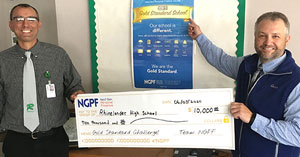To say that 2020 was “unconventional” would be a vast understatement. The pandemic hit hard, and what started as a health threat quickly evolved into something bigger, wreaking havoc on our financial health as well. What’s more, it has cast a spotlight on a problem that has plagued the U.S. for decades: the lack of financial literacy.
While this exposure may feel like a “piling on” of the many woes we face in the midst of the pandemic, financial literacy advocates see it as an opportunity to move the needle on our nation’s financial health.
One of those advocates is Patrick Kubeny, a business education teacher in Rhinelander. He may look familiar because his name and face have been on the pages of your$ before.
“Financial literacy is critical for navigating financial decisions…and life,” says Patrick. “It’s a critical survival skill. People’s lives can be monumentally improved if they are financially literate AND if they use that knowledge.”
Without the skill set, he adds, things can deteriorate quickly when events like a pandemic happen—making it increasingly more difficult for those without a solid financial foundation to gain ground.
Lack of knowledge is costly
Patrick has been teaching personal finance for over a decade at Rhinelander High School (RHS), where it is a required course for graduation. And while he is doing his part to instill essential money skills in northern Wisconsin, it’s not a skill we are honing as a nation. In fact, there has been a clear decline in financial literacy over the past nine years—dropping 8 percentage points to 34%.1
Despite having the world’s largest economy, the U.S. is ranked 14th when it comes to the percentage of adults who are considered financially literate, with just over a third of Americans able to answer simple questions about inflation, compound interest, and diversification.2 This lack of knowledge comes with a significant cost as consumers who fail to understand these concepts spend more on transaction fees, run up bigger debts, incur higher interest rates on loans, and save less.
Moving it forward
For Patrick, the solution is simple: more financial education. “Right now, only 1 in 6 students across the nation graduate with a decent financial literacy education,” he says. That’s just 17%.3
The key, he says, is to teach them practical money management skills that will prepare them for adulthood—before they acquire bad habits—and do it in a way that engages them and makes it real. “My favorite way to teach is my favorite way to learn…that’s telling stories. And when the story is true and you can put a name and a face to it, it’s sticky.”
Patrick puts a personal spin on his lesson plans and he does it to a degree that would make most people squirm. “I use my personal finances to support the curriculum as much as possible. I show students my paychecks, Social Security statements, online checking accounts, monthly budget, credit card statements, taxes, and investment accounts. I want the subject matter to be as real as possible because I believe people learn best from examples and real life situations.”
In addition to sharing his finances, Patrick has students take a hard look at their own future financial situation. Students must create a Lifetime Financial Plan that includes their potential earnings, taxes, estimated expenses for housing, transportation, and raising a family. “This exercise shows them what decisions they will have to make and how those decisions will impact their life and financial future.”
Before setting them loose to map their own future, he runs through a scenario that relies on a $10/hr. wage job to illustrate what their bottom line will look like after accounting for real life expenses. “I let them see mathematically what it looks like if they choose to graduate from high school and not pursue a degree or trade. It’s not a pretty picture, but this leads to conversations on education, career paths, and income.” He even addresses the importance of being on the same financial page as your future spouse.
Patrick also coaches RHS teams for the Finance and Investment Challenge Bowl—a program created by Asset Builders. “It’s a fun way for my students to showcase what they’ve learned.” Teams compete in regional tournaments for a spot at the state competition. “Rhinelander teams have done well. I’m very proud of them.”
What’s most pertinent to Patrick and what really fuels his passion is the impact he can have. “These are important skills that these kids will use for the rest of their lives. And the majority of the students think it is a very important and practical course…they actually want to be financially literate.”
The payoff
Patrick shares that many of his students report they are already using their knowledge to make spending decisions, navigate credit card offers, and even save for retirement with a Roth IRA. This coincides with findings from a 2018 study that indicated 88% of young adults who took a personal finance course said they were using what they were taught in class.4
He emphasizes to students that they need to be in charge of their personal finances. “They alone are responsible for their financial future. I like to say, ‘No one will ever care about your money more than you will, so the more you can learn about taking care of it, the better off you will be.’ ”
Patrick also hears from countless former students. They stay in touch and thank him. Several are now new teachers in his district where he continues his mentorship as a colleague. “One of my favorite things to do is help my fellow teachers. I hope to continue helping educators build financial security even after I retire.”
Trickle up
Patrick’s course is not only popular with the students, parents like it too. “The coolest thing is that there is this ‘trickle up’ that happens when students take what they learn home to their family. Parents come in for conferences and report that they’re getting schooled on financial matters. ‘Did you know this? You should be doing that…’ Parents are impressed and say they learn something new.”
Many ask if they can take the class and Patrick invites them to work on the modules he assigns alongside their kids. “They can do this on their own as well, and the best part is it’s free,” he says.
While not every district will have the parental support for personal finance courses that Rhinelander enjoys, it seems to be on the uptick. National research conducted in June found that 63% of American adults want financial literacy to be a priority in school—even over health and wellness education.5
The “Gold Standard”
 This year, RHS received a $10,000 grant from the nonprofit Next Gen Personal Finance (NGPF) thanks to Patrick’s continued passion and advocacy for financial literacy. “While the topic of personal finance has been taught at Rhinelander High School for decades, we became eligible to receive this award because we recently adopted a policy requiring all students graduating from our school to take and pass a specific one semester personal finance course,” Patrick explains.
This year, RHS received a $10,000 grant from the nonprofit Next Gen Personal Finance (NGPF) thanks to Patrick’s continued passion and advocacy for financial literacy. “While the topic of personal finance has been taught at Rhinelander High School for decades, we became eligible to receive this award because we recently adopted a policy requiring all students graduating from our school to take and pass a specific one semester personal finance course,” Patrick explains.
NGPF is very supportive of other courses such as economics or consumer education that include financial instruction; however, they only provide grant monies to schools that specifically require a personal finance course. RHS is among 800 school districts in the nation to require a one-semester personal finance course, but one of only 23 high schools in the country to earn the grant and be designated a “Gold Standard” school.
A way ahead for Wisconsin
When it comes to financial literacy statewide, however, Wisconsin as a whole doesn’t fare so well. Wisconsin earned a grade of “F” in a 2017 report on financial literacy from the Champlain College Center (The Center) for Financial Literacy. Every two years, The Center uses national data to grade all 50 states on their efforts to produce financially literate high school graduates.
For the most part, Wisconsin leaves it up to the district to decide if and how they want to do it. The Center is in favor of statewide mandates, but Patrick isn’t sure that’s the optimal way to go. “Some districts would be hard pressed to find the money or the staff qualified to teach personal finance. If you don’t have the ability to do it well, it probably won’t be as effective as having it come from a local, more organic effort.”
He notes that it took years for Rhinelander to make the change. “My predecessor and colleague did a great job getting the course added as an elective, and she advocated from day one for it to be required. Unfortunately, she retired before it was realized, but she was instrumental in getting it done,” he says. Patrick also had solid support for the policy change from his principal and the school board.
Patrick encourages educators to consider teaching or proposing a personal finance class in their district.
“It will change your life and the lives of your students. A fringe benefit of being a personal finance instructor is that you’ll learn how to improve your own finances when you teach this class.”
A great place to start, he says, is NGPF (ngpf.org). NGPF is a resource Patrick uses often in his classroom. They have a library of classroom resources and they offer certification courses. Patrick is about to complete his fourth certification course. “And there is no cost.”
Patrick is at the tail end of his teaching career and he feels fortunate to be winding down in such a positive and satisfying way. “I am just happy to know that when I retire it won’t mean the end for financial literacy in the district. I am very proud of my school district for being progressive and adopting a policy like this. I hope other school districts will be motivated and inspired to do the same thing. I sincerely believe that districts should not be asking themselves how can they justify a mandated policy like this; rather, they should be asking themselves how can they justify NOT doing so.”
SOURCES: 1 FINRA: 2018 State of U.S. Financial Capability study / 2 Standard & Poor’s survey / 3 Impact of High School Financial Education-World Bank study / 4 2018 study T. Rowe Price / 5 Charles Schwab Financial Literacy Survey
 PROFILE
PROFILE
Professional: Patrick has been a business education teacher at Rhinelander High School since 1993. He is the recipient of the 2020 Excellence in Teaching Award given annually by Economics Wisconsin, a $10,000 grant from NGPF, and was named a 2020 Kohl fellow. Patrick is nationally certified to teach financial literacy and was a 2013 Recipient of the Governor’s Financial Literacy Award.
Personal: His family includes wife Katrina (who teaches 5th grade in Elcho), a daughter (22), and a son (19). His wife, mother, and in-laws all have Roth IRAs with Member Benefits. Patrick is looking to retire in the next couple of years but won’t be at a loss for things to do. He loves to hunt and fish and hopes to continue helping Wisconsin teachers become financially secure.